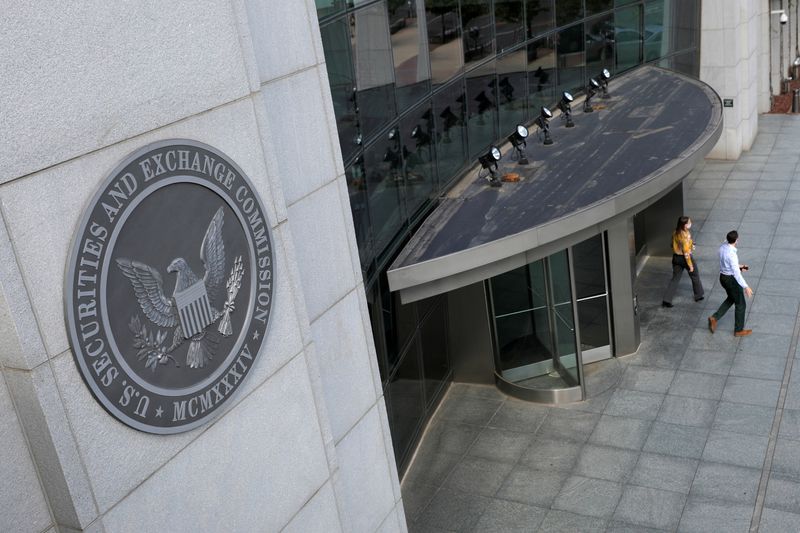By Luc Cohen and Hannah Lang
NEW YORK (Reuters) - Alex Mashinsky, founder and former CEO of bankrupt cryptocurrency lender Celsius Network, pleaded not guilty Thursday to U.S. fraud charges that he misled customers and artificially inflated the value of his company's propriety crypto token.
Three federal regulatory agencies also sued Mashinsky and Celsius in connection with the case.
Mashinsky was charged with seven criminal counts - including securities fraud, commodities fraud and wire fraud - according to an indictment unsealed earlier on Thursday.
He is one of several crypto moguls to be indicted in another blow for the industry, which is undergoing a reckoning after a slump in crypto prices led to the collapse of several companies, including exchange giant FTX. That company's founder, Sam Bankman-Fried, was charged with fraud last year, and has pleaded not guilty.
Mashinsky, 57, arrived in federal court in Manhattan for his arraignment wearing a gray polo shirt, jeans and no handcuffs.
U.S. Magistrate Judge Ona Wang said he would be released on a $40 million bond secured by his Manhattan residence.
"Whether it's old-school fraud or some new-school crypto scheme, it doesn't matter one bit. It's all fraud to us," U.S. Attorney Damian Williams said at a press conference detailing the charges.
'PROFITS IN YOUR POCKET'
Founded in 2017, Celsius filed for Chapter 11 bankruptcy protection in July 2022 after customers rushed to withdraw deposits as crypto prices fell. Many have been unable to access their funds.
Crypto lenders such as Celsius grew rapidly as crypto prices surged during the COVID-19 pandemic. They promised easy loan access and eye-popping interest rates to depositors, then lent out tokens to institutional investors, hoping to profit from the difference.
Celsius was among the first in a series of bankruptcies in the cryptocurrency sector last year as token prices cratered amid rising interest rates and stubbornly high inflation. It filed for bankruptcy shortly after Singapore-based crypto hedge fund Three Arrows Capital and rival crypto lender Voyager Digital did likewise.
Mashinsky and Celsius' former chief revenue officer, Roni Cohen-Pavon, were charged with market manipulation of the company's crypto token, known as Cel, as well as a fraudulent scheme to manipulate the price of the cryptocurrency and wire fraud related to the manipulation of the token, according to the indictment.
Prosecutors alleged Mashinsky also personally reaped approximately $42 million in proceeds from selling his holdings of the Cel token. Celsius was not charged.
U.S. Attorney Williams said at the press conference that Cohen-Pavon is located abroad and is an Israeli citizen, but declined to comment on whether the former Celsius executive would be extradited.
The U.S. Securities and Exchange Commission (SEC) also sued Mashinsky and Celsius on Thursday, according to a court filing, alleging he and his firm raised billions of dollars through the sale of unregistered crypto securities and misled investors about the financial state of the privately held company.
The SEC, along with other regulatory agencies which also filed lawsuits Thursday, accused Mashinsky and his company of touting Celsius as safe - akin to a traditional bank - even as they took increasingly risky steps to deliver promised returns of as much as 17%.
Celsius used emails with phrases like "Pour Yourself a Cup of Profits" and "Profits in your Pocket" to promote its interest-earning program.
While the firm lost millions of dollars as customers raced to withdraw funds, Mashinsky and Celsius continued to claim it company was financially secure and had enough funds to meet withdrawals, regulators said.
The SEC also said Celsius engaged in "risky trading practices" and made uncollateralized loans, despite telling investors it did not. The company also falsely claimed to have raised $50 million from its initial token sale, and claimed to have 1 million active users when in fact it only ever had around 500,000 depositors, many of whom were no longer active, the SEC said.
The U.S. Commodity Futures Trading Commission and the Federal Trade Commission also sued Celsius and Mashinsky. The FTC said it had reached a settlement with Celsius that will permanently ban it from handling customers' assets.
The Justice Department entered into a non-prosecution agreement with Celsius, in which the company accepted responsibility for its role in the alleged schemes and pledged to continue cooperating with investigators, Williams said,
Thursday's lawsuits add to a series of challenges for Celsius Network and its founder. In January, New York state's attorney general sued Mashinsky, also alleging fraud.
The crypto industry has been on even shakier ground since the SEC sued crypto exchanges Binance and Coinbase (NASDAQ:COIN) Global last month raised risks of further regulatory challenges for the sector.
However, the industry got some cheer in another federal court in New York on Thursday. In a landmark ruling, a judge decided Ripple Labs did not violate federal securities law by selling its XRP token on public exchanges, a win that sent that cryptocurrency's value soaring.
